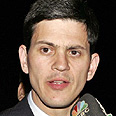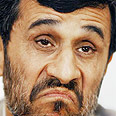

Major powers agreed on Friday to make a new offer of incentives to Iran to halt its sensitive nuclear work and a European diplomat said helping Tehran develop civil atomic power remained at the heart of the proposal.
The offer, whose details have not been made public, is based on a package of economic and political benefits laid out by the five permanent members of the UN Security Council and Germany in June 2006 but so far spurned by Iran.
"I am glad to say that we have got agreement on an offer that will be made to the government of Iran," said British Foreign Secretary David Miliband, flanked by senior officials from China, France, Germany, Russia and the United States.
"We very much hope that they will recognize the seriousness and the sincerity with which we have approached this issue and that they will respond in a timely manner to the suggestions that we are making," he added.
The United States and other Western nations suspect Iran of using its civil nuclear program as a cover to develop nuclear weapons. Iran says its nuclear program is to generate electricity so that it can export more of its oil and gas.
The incentives offered to Iran in 2006 included civil nuclear cooperation and wider trade in civil aircraft, energy, high technology and agriculture, if Tehran suspended uranium enrichment and negotiated with the six.
Uranium enrichment can be used to produce fuel for nuclear reactors or for atomic bombs.
The 2006 proposal included recognition of Iran's right to develop civil nuclear energy, a promise to support the building of new, proliferation-resistant light water reactors and guarantees that Iran would have access to fuel.
Russia has been the main country to promote the idea of refreshing the June 2006 offer while the United States has made no secret of its skepticism, with US officials saying they saw little reason to expect Iran to change course.
'More attractive'
The European diplomat said the heart of the previous offer – helping Iran develop civil nuclear power, including with state-of-the-art technology – remained.
"The central part is maintained. It also contains a series of elements that can make the core more attractive," said the diplomat, who asked not to be named. "It relates to economic issues," the diplomat added, declining to elaborate.
The major powers have pursued a two-track approach towards Iran, offering economic and political benefits on the one hand and championing three UN Security Council resolutions that imposed sanctions against Iran on the other.
"We have always been clear that should be accompanied by an offer to Iran showing the benefits of engagement and cooperation with the international community and our meeting today has been dedicated towards taking the offer that we made in June 2006, reviewing it, and updating it," Miliband said.
French Prime Minister Francois Fillon said attacking Iran to prevent it from obtaining nuclear weapons was not an option.
"We have to do everything we could to avoid finding ourselves faced with the only solution of bombing Iran," he told a news conference through an interpreter. "The only option is to pressure the Iranian government through diplomatic means, economic means, and financial means."
A senior US official told reporters that the fine print of the new offer, which he described as "updated," was still being worked out but was likely to be finalized within a week.
He sought to play down expectations, saying "what we have been discussing really updates that (2006) package, is based on it, builds on it ... but it is hardly a brand new package."
He declined to say whether it might be put forward to the Iranian government by European Union foreign policy chief Javier Solana, who has represented the six nations in talks with Iran, or whether it might be transmitted in writing.
As she flew to London on Thursday, US Secretary of State Condoleezza Rice stressed Iran's failure to respond to the incentives already on the table and she emphasized raising pressure on Iran by enforcing the UN sanctions.
The Bush administration, reversing its policy, agreed to offer incentives to Iran in 2005, and to broaden the proposal in 2006, only with great reluctance.















